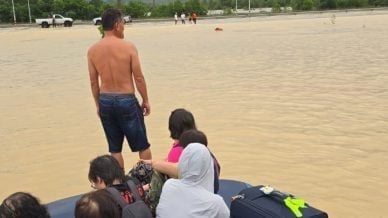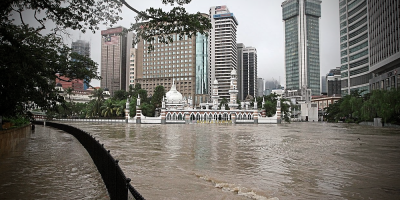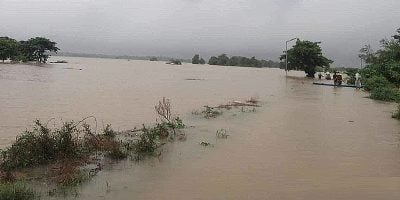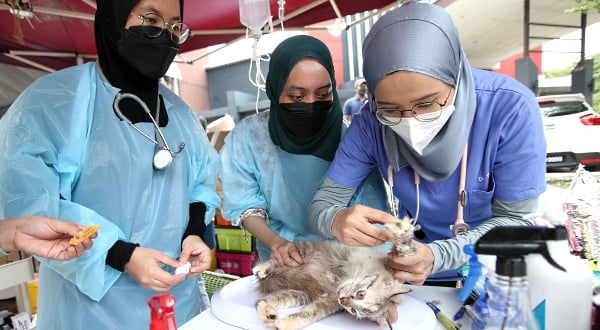
Many organizations and individuals rushed to the areas badly hit by the December floods with relief items and daily necessities in hope of offering the much needed assistance to the victims.
Among them, some went to the disaster zones to help rescue not just human victims but hundreds of stranded animals!
That was the largest ever animal rescue operation ever staged in this country.
The animal clinic operation at Taman Sri Muda in Shah Alam began on December 21 and lasted for seven days.
All lives are precious
Veterinarians, students and volunteers went into the flooded areas even before the floodwaters had subsided, in order to rescue and feed the animals stranded on the roofs or inside flooded houses.
Animals suffering from poor health conditions were provided basic treatment by the vets on site, while more severe cases were referred to nearby animal clinics.
The operation received overwhelming response from the public and over 40 people joined the operation daily, including veterinarians, students, volunteers and animal lovers.
It was actually not easy for the volunteers to approach these drenched, starved and frightened animals.
Some have argued that we should allocate our resources to rescue human victims instead of animals, but as all lives are equally precious, these distressed animals too are entitled to the opportunity to keep on living.
Moreover, to pet owners, these animals are treated as part of their families. Unfortunately during such disastrous moment, many had no choice but to leave their pets behind.
Although the country had seen plenty of serious and minor floods prior to this, never was once such a massive operation to rescue stranded animals was launched. This shows that indeed there has been a marked improvement among the Malaysian public in animal welfare awareness.
It is lucky that while many people were out there providing assistance to flood victims, a handful of kindhearted people did not forget about these completely helpless animals and pets and did their utmost to take these animals out of danger.
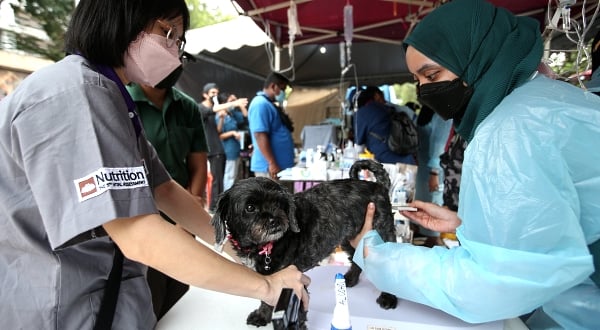
‘Set them free’
The operation’s initiator, Malaysian Veterinary Medical Association (MAVMA) exco member Dr Farina Mustaffa Kamal said she read from news reports and social media that many animals were stranded or killed in the floods, and decided to contact various parties, including veterinarians, medicine suppliers, food suppliers, etc., to pool their resources together and rush to the flood zone within the shortest time possible.
Dr Farina, who is also a senior lecturer at UPM’s veterinary medicine faculty, applied to the university for the mobile clinic facility, while her students avidly joined her rescue team so that the operation could be started as soon as December 21.
When Sin Chew Daily visited the flooded areas at Taman Sri Muda on the fifth day of the operation, Dr Farina told us some 300 animals (80% cats, 20% dogs and a couple of bird too) had been rescued during the previous four days.
“Some of these animals suffer from dehydration, breathing difficulty, vomiting, bacterial infection and external injuries while escaping.
“When we arrived here, all we could do was to provide some basic treatment. We will need to send the animals to nearby animal clinics if they require further treatment.”
Dr Farina said most of the animals rescued by them had owners who were forced to leave them behind when fleeing the rising floodwaters. As such, the volunteers had to upload the pictures of the animals on social media with the hope their owners would come look for them later.
She said some of the treated animals had indeed been claimed back by their owners, while the unclaimed animals were being taken care of temporarily by the Society for the Prevention of Cruelty to Animals (SPCA) Selangor or the volunteers, until their owners return or new owners are found.
Dr Farina noted that like humans, animals might also suffer from post-traumatic stress disorder (PTSD) and they appeared to be fearful when approached by the volunteers trying to bring them down from the roof.
“Even after being rescued or claimed back by their owners, they still need time to adjust emotionally. The owners just need to be more patient dealing with them.”
She advised owners to quickly evacuate before the floodwaters rise to dangerous levels, and if they cannot afford to take their pets along, they should put the animals on higher ground and leave them some food and water.
Instead of tying them or locking them in cages, she said the animals should be set free so that they can escape to safety themselves, otherwise they will die certainly.
“We saw that most of the dead animals had been caged or tied, thus unable to escape.
“Remember, set them free in the event of a disaster!”
Dr Farina used to join the local veterinary associations and animal rights groups to rescue stranded animals in wild fires while studying in the United States. She never expected that the experience she picked up then could be put to good use in the recent Selangor floods.
“If we don’t save the animals, no one will. Their lives are equally precious and worthy of our utmost effort to save them.”
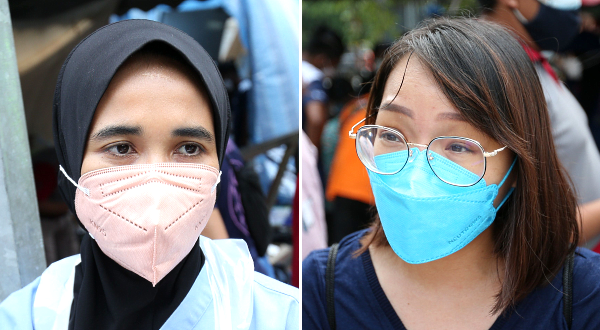
Meaningful Christmas
UPM faculty of veterinary medicine lecturer Dr Michelle Fong is Dr Farina’s logistics chief, responsible for manpower coordination, and arrangements for medicines, foods and job assignments.
She said after the start of the operation, response from the public was very encouraging. In addition to medical supplies and food, cash donations also poured in, amounting to over RM50,000 in just seven days.
“Where the duty roster is concerned, I divide the seven days into 14 different shifts which are very quickly taken up. Some of the vets even take up multiple shifts. I think they all hope to do something for these ill-fated animals.”
She admitted that veterinarians felt the pain seeing these animals suffer, some drowned, some curling up on rooftop in hunger and cold. They all had one common goal, to do something to save the animals. That’s why the team could be put up in such a short time.
A Christian, Fong was unable to celebrate the holiday with family because she had to rush to the disaster zone to help. However, she said she had a truly meaningful Christmas this time!
“Although we have saved hundreds of animals, some have unfortunately been infected with diseases such as feline panleukopenia virus (FPV). We have no choice but to put them down. We’re utterly devastated too!”
She said majority of the rescued animals had owners, adding that many pet owners came back looking for the animals after the water subsided, and would come to the mobile clinic if they didn’t manage to find, or claimed their pets after seeing the pictures posted on social media.
“Many dogs have become strays during the floods. They gather at a specific area. After observing them for some time, we found not much problem with them, and just gave them some food and water and plan the next course of action later.”
Most of the animals receiving treatment at the mobile clinic are cats. As they don’t swim, they have to move higher and higher until the rescue team arrives.
“Many of these animals suffer from post-traumatic syndrome and are easily frightened or grow suspicious of humans. Some don’t even dare to come down and we need time to pacify them.”
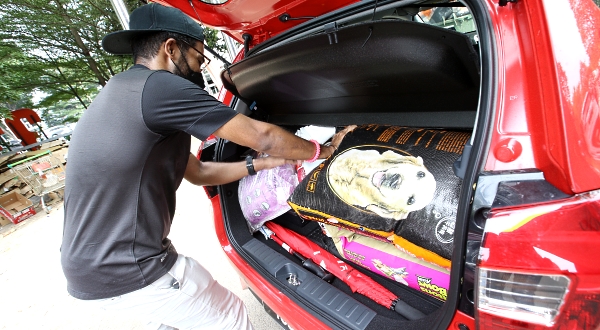
Read also:
ADVERTISEMENT
ADVERTISEMENT







